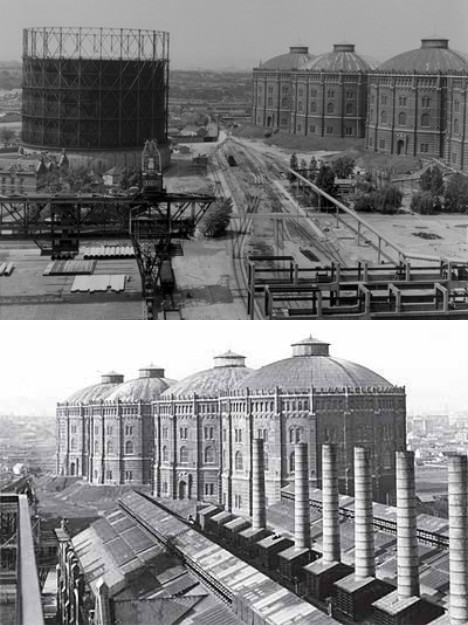When I leave Brno, I will be leaving
the Czech Republic behind and traveling to spend time in Vienna, Austria. While
there, I will have the opportunity to visit a series of buildings with truly
unique architecture, the Gasometers. These buildings, also known as Gasometer
City, were constructed in 1896 by an engineer named Schimming. These four
buildings were the largest gas storage containers in Europe, and were excellent
examples of “industrial architecture,” (“History of the Gasometers,” 2014). The
Gasometers continued to be in use until 1986. Vienna converted to natural gas
from 1970-1978, making these buildings obsolete, (“History of the Gasometers,”
2014). The question then arose about what to do with these massive structures, once
they did not serve a necessary industrial purpose.
 |
In 1995, it was decided that the
Gasometers would be repurposed and remodeled. Each of the four Gasometers was
worked on by a different architect. Jean Nouvel worked on Gasometer A, Coop
Himmelblau worked on Gasometer B, Manfred Whedorn worked on Gasometer C, and
Wilhelm Holzbauer worked on Gasometer D, (“The Architecture of the Gasometers,”
2014). The remodeling project was completed between 1999 and 2001. Although
each Gasometer was worked on by a different architect, the general layout of
the Gasometer is similar. The upper floors contain apartments, the middle
floors contain offices, and the lower floors contain a shopping mall. The
Gasometers are connected by skywalks on the shopping mall levels. The historic
outside of the buildings were preserved, (“The Architecture of the Gasometers,”
2014). The Gasometers currently contain around 620 apartments, an event hall
that can hold 3,500 people, a movie theater, the shopping mall, Vienna’s municipal
archive, the offices of a telecommunication company, a school, and a medical
facilities, (“The Architecture of the Gasometers,” 2014.)
I am greatly looking forward to
visiting Gasometer City because I find the idea of converting old industrial buildings
into functioning modern residential and urban buildings to be fascinating. The repurposing
of these buildings was a massive project that I cannot wait to see first-hand
during my stay in Vienna.
References:
Wiener
Gasometer. (2014). The Architecture of
the Gasometers. Retrieved from http://www.wiener-gasometer.at/en/gasometer
Wiener
Gasometer. (2014). History of the
Gasometers. Retrieved from http://www.wiener-gasometer.at/en/history
Picture
References:
http://vienna-unwrapped.com/wp-content/uploads/2014/03/Jean_Nouvel_Buildings_Gasometers_01.jpg
http://weburbanist.com/wp-content/uploads/2010/07/gasometers_1.jpg
http://www.wiener-gasometer.at/images/stories/gasometer_aussen.jpg
